January is the time to try something different, preferably with a side of restriction and added health benefits – giving up alcohol, starting a new fitness regime, or jumping on the Veganuary bandwagon.
Food manufacturers and bakers are often more than happy to cater for the latter, flooding the market with new and innovative plant-based products to make the month more appetising. But this year things feel a bit quieter – while there is some NPD, it does not seem to be in the usual numbers.
So, has the vegan bakery market peaked? Is January no longer the key season for vegan product launches and sale? Or are there different tactics at play?

It has now been more than a decade since Veganuary burst onto the scene with the campaign claiming to have directly supported more than 1.8m worldwide in 2024. However, a survey by bread supplier Americana found that the number of people planning to participate in Veganuary in 2025 was down significantly from previous years. On the positive side for plant-based purveyors, the same research found a whopping 86% of Brits planned to cut down on meat consumption or remain vegan past the end of this month, while 76% said they would order a vegan dish any time of the year.
“The post-Christmas period sees consumers being more mindful in their menu choices, which is a key opportunity for driving engagement with plant-based dishes,” comments Samantha Winsor, marketing manager at Americana. “Beyond Veganuary, any learnings can be fed into the rest of the year, ensuring consumers keep coming back for more.”
According to YouGov’s biannual dietary tracker for 1 January 2025, 3% of all UK adults consider themselves vegan, up from 2% a year ago. “This is likely to increase over time as 4% of 18- to 24-year-olds say they follow a plant-based diet,” notes Stéphanie Brillouet, marketing manager at bakery supplier Délifrance, citing a 2024 statistic that has now risen to 5%.
The flexitarian demographic – those who do not follow a strict vegan diet but are focussed on reducing their meat intake and increasing the number of plant-based options they consume – also continues to grow and now accounts for 22% of UK adults, according to Americana’s survey.
Pastry power
The plant-based market in retail food is currently worth £357m according to Kantar and Circana data to 3 November 2024, but it is facing challenges.
Helen Bowyer, commercial director – foodservice at The Compleat Food Group, notes an overall volume decline of 9.4% in the past 52 weeks, with an 8.3% drop in the past 12 weeks. But there is one bright spot. “Vegan pastry is outperforming the wider category, showing 0.7% growth in the past 12 weeks,” she adds. “Pastry is therefore key in plant-based bakery, to attract both shoppers and diners, and drive growth in this area.”
Compleat helped create a new range of pies for plant-based brand Symplicity, which combines fermented vegetables with other vegetable ingredients and popular seasonings – examples include the Mince, Stout & Onion Pie, Chorizo Style & Butter Bean Pie, and the Cumin Spiced Keema Pie. “These pies not only put veg in the spotlight, but also offer gut health benefits through the fermentation process, satisfying another popular health trend,” adds Bowyer.

Greggs also continues its focus on savoury vegan pastries but has repeatedly dipped into its back catalogue of late, relaunching items such as the Vegan Steak Bake and Vegan Festive Bake with ‘new and improved’ recipes. For the latest Veganuary run, it has brought back its Spicy Vegetable Curry Bake (rsp: £2.10) – first rolled out on its Christmas 2023 menu – containing peppers, carrots, chickpeas, parsnips, potatoes, broccoli, and sweetcorn, mixed in curry sauce with a chilli kick.
Meanwhile, other businesses are crafting sweet plant-based pastries to tap into the rising demand for viennoiserie at supermarket in-store bakeries.
Délifrance, for example, launched its new Impact range of vegan items for foodservice last year including a chocolate babka, cinnamon bun, and apple tart. These were created in collaboration with French baker and pastry chef Rodolphe Landemaine, founder of the first vegan boulangerie in Paris, Land&Monkeys. “It is a real challenge to make plant-based products with lots of aroma and lots of taste,” he comments. “We’ve managed to develop things that are the opposite of what we are used to seeing from vegan products, and that offer textures you would find in classic bakery products.”
Vegan on the down low
This was a tactic which has paid dividends for Bells of Lazonby’s free-from cake brand We Love Cake. It’s lemon tarts – which were named New Bakery Product of the Year in 2022 thanks to being indistinguishable from classic versions of the Sicilian dessert – saw sales leap 24% year-on-year in 2024. It is now predicting its vegan and gluten-free sweet treat, which it sells frozen to foodservice operators and wholesalers, will achieve sales of over £1m this year.

“The flexibility of the product is key with end users often serving it as a mainstream dessert, only notifying the consumer if they specifically ask for a vegan alternative,” says Josh Boydell-Smith, head of marketing at We Love Cake. The brand also recently redesigned its consumer-facing retail packs – notably forgoing the words ‘vegan’ or ‘plant-based’ on the front of pack to highlight their gluten & wheat-free and milk-free credentials as well as adding the description ‘joy full’ in the same space.
“There’s a misconception that vegan products are only for vegans”
Keeping the vegan element of a product on the down low is becoming increasingly common. Some of this is due to persisting consumer perceptions that vegan options are somehow lacking in taste, texture, or quality versus their standard counterpart (although developers have been working hard to ensure this isn’t true). Another reason is that wider ethical claims are also rising in importance.
Wes Burden, founder of Folkestone-based Docker Bakery, believes “we’re just at the start of an exciting new era of food – one that’s ethical, sustainable, and genuinely delicious”, adding the idea that vegan food is bland or less indulgent feels outdated. Education is key though. “Communicating these benefits in a relatable way can help build even greater trust and loyalty,” he notes.
Many of the bakery’s products, including cookies and pastries, are vegan, but not overtly labelled as such. Take the Hazelnut Pain au Chocolat – although the website listing mentions that it is plant-based at the very bottom of the page, the main description and imagery has none of the usual hallmarks of vegan-friendly food, instead evoking indulgence, texture, and flavour.
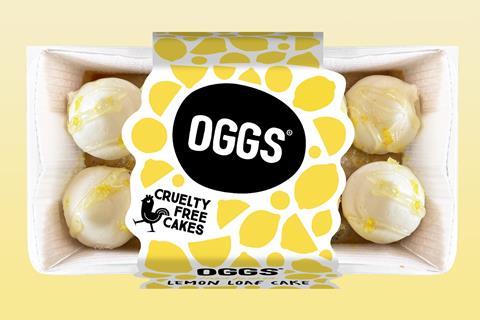
Plant-based bakery brand Oggs is another firm embracing this shift, with co-founder Hannah Carter revealing that 68% of its customers are not vegan but buy for ethical reasons. The B Corp-certified company, which uses its patented Aquafaba egg alternative in recipes, has updated its packaging to proudly place ‘Cruelty Free Cakes’ on the front whilst keeping ‘vegan’ in smaller font on the back.
“Vegan consumers are loyal and share products within their community, but Oggs is targeting non-vegans for greater impact,” discloses Carter. “There’s a misconception that vegan products are only for vegans, so rebranding aims to break this perception.”
She also claims that ethical branding and cruelty-free messaging are more sustainable long-term strategies, noting that Oggs and allergen-free cake brand Just Love have been maintaining their market positions whilst other vegan brands were declining.
Veganism has become “just one part of the overall health halo”, adds Jacqui Passmore, marketing lead West EU & AMEAP at bakery supplier Dawn Foods. “Our consumers are looking for bakery products which meet several dietary requirements in one product, such as vegan, gluten free, and reduced sugar, as well as functional attributes such as mood boosting flavours for mental wellbeing or added protein and fibre to increase energy,” she says. “A vegan bakery product is now the starting point for something that is required to deliver on many other levels too.”
Cracking the egg problem
This adds a level of complexity to baked goods which are often already more complicated to produce than ones containing egg and dairy products. Recent years have welcomed many creative strides in the vegan market, but not all of the problems have been cracked.
The egg alternatives often excel in specific areas, such as binding or leavening, but may fall short in others like emulsification or creating a rich texture, observes Burden at Docker Bakery. “This limitation can sometimes restrict the range of vegan baked goods that can be produced,” he adds.
Carter at Oggs, meanwhile, highlights meringues, roulades, and glazes as being especially challenging to make without eggs, which are “often the last ingredients people eliminate” when going vegan.
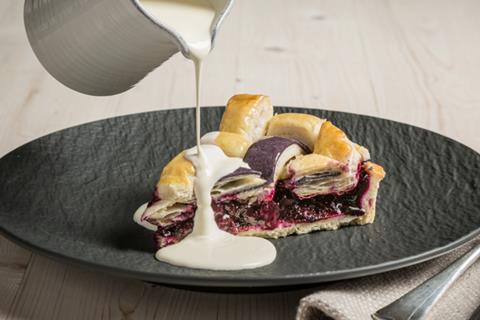
There’s also a continued focus on fat replacement, particularly as butter is often the hallmark of quality in certain baked goods. We Love Cake’s Boydell-Smith reveals the company’s NPD team is working on new plant-based butters that offer not only better binding texture, but a creaminess identical to the cow’s milk butter plus a flavouring of salt for an even more sensory experience.
“As an industry, once we have cracked fat replacements in vegan bakery – where it’s so good you can’t taste the difference – we open many doors in terms of variety and accessibility in production,” asserts Boydell-Smith.
Kirsty Matthews, marketing manager at ingredients manufacturer Macphie agrees, noting that it is essential to combat the perception that vegan products compromise on taste by investing in developing products that match or exceed traditional offerings in flavour and texture. “The challenge is not just creating a vegan base, but making it stand out,” she explains. “Successful bakers are thinking holistically, considering complementary offerings like dairy-free drink options and environmentally conscious packaging to appeal to eco-conscious consumers.”
A star attraction
A good vegan offering can be a star attraction for a business – quite literally in the case of Coughlans Bakery. The Southeast England chain first attracted vegan comedian and TV presenter Romesh Ranganathan as a customer around eight years ago, thanks to its range that is roughly 95% plant-based, and has since fostered the relationship further to see him become a part owner in November.

Coughlans and Ranganathan also collaborated on the creation of the Ranga Yum Yum, a vegan doughnut twist topped with chocolate and Biscoff crumbs, which was rolled out at stores in May 2024.
So, has the bakery market peaked? While some areas are in decline, it is clear that due to sustainability, health and more, the grass is looking greener for plant-based bakery in 2025.



















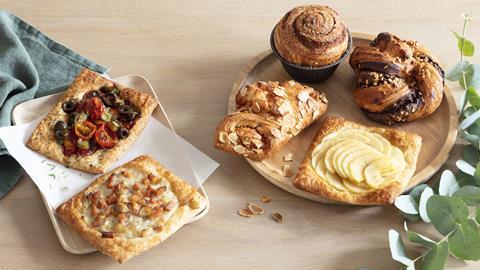
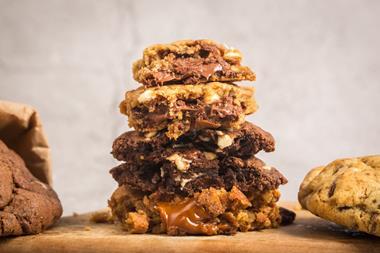
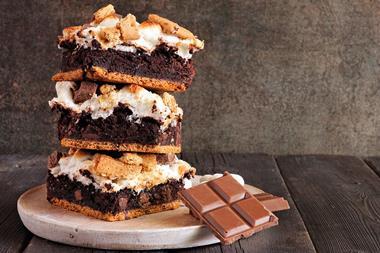

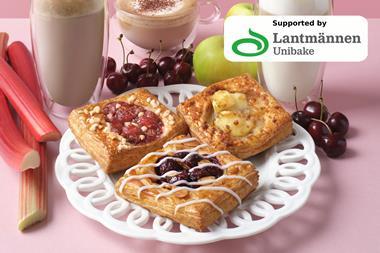


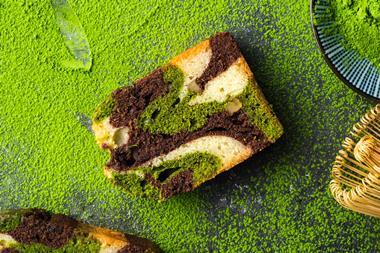
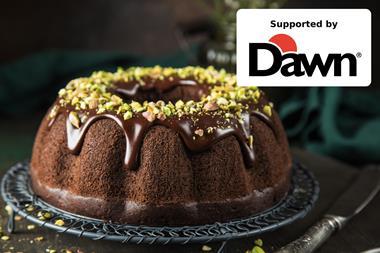
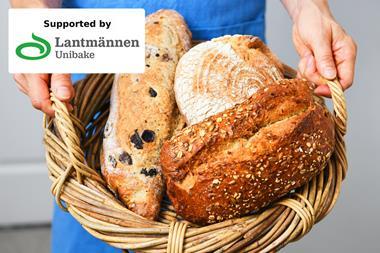
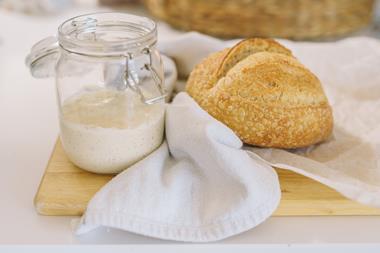

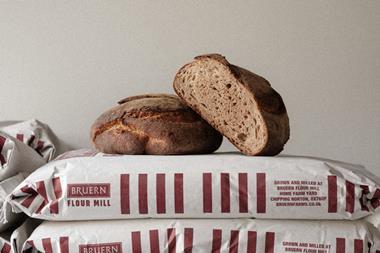

No comments yet